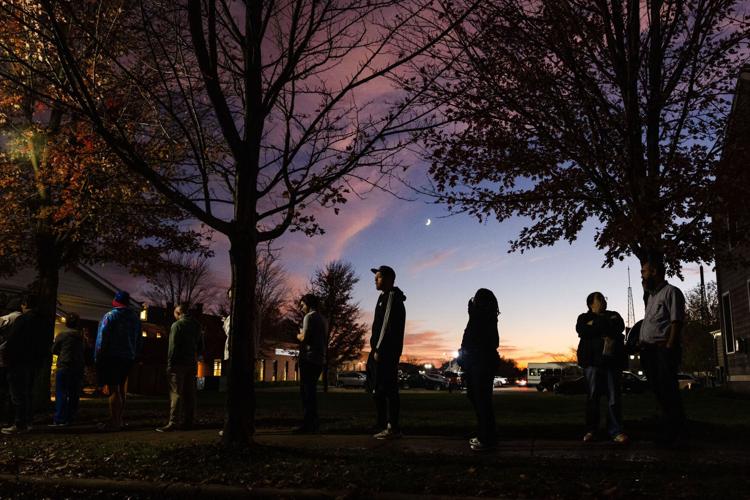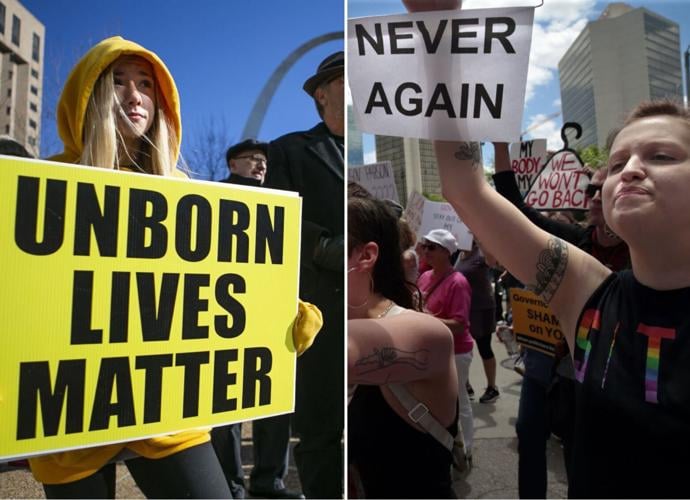
Hannah Noelle, left, at an anti-abortion rally in 2021;��Maia Hayes, right, at an abortion rights rally in 2019. Both protests were held in downtown St. Louis.��
JEFFERSON CITY — An amendment to enshrine reproductive rights in the Missouri Constitution was leading with about half of votes tallied Tuesday night.
UPDATE: Amendment 3 has passed
Amendment 3, which would overturn Missouri’s abortion ban, was winning with about 55% of the vote in the statewide tally, according to the Associated Press. That included a wide lead in competitive Platte and Clay counties on the western side of the state and a narrow lead in Republican-leaning Buchanan County.
The question was also winning 58% support in conservative Pettis County, where Sedalia is located, with nearly all results reported.
People are also reading…
Supporters of the Missourians for Constitutional Freedom campaign, who pushed for Amendment 3’s passage, gathered in downtown St. Louis Tuesday night.
If approved, the constitutional amendment will take effect early next month. After that, litigation is expected to overturn Missouri abortion restrictions, including the current ban that doesn’t allow for the procedure in cases of rape and incest.
Amendment 3 would allow abortions until after the point of fetal viability, or about 24 weeks of pregnancy. Abortions after fetal viability would be allowed if the life or health of the mother is at risk.
Missouri was among 10 states Tuesday to weigh in on abortion rights, though five of those states already allow abortions at least up to the point of fetal viability or 24 weeks of pregnancy.

Levi Zoltowski, center, from St. Charles, waits in line to vote on Tuesday, Nov. 5, 2024, at St. Charles Christian Church in the New Town area of St. Charles. At 5:45 pm, the line to vote at the church stretched one city block and Zoltowski said he and other voters had been waiting in line for approximately 30 minutes.
Five other states, including Missouri, were voting on whether to reverse abortion restrictions currently in place. Like Missouri, South Dakotans were voting on whether to overturn that state’s strict abortion ban.
A question to protect abortion rights in Florida to the point of fetal viability was losing Tuesday as the measure was falling short of the 60% approval needed to amendment Florida’s constitution.
With an estimated 9 in 10 votes counted, the amendment was winning 57% of the vote, according to the Associated Press.
Florida’s current law, which took effect this year, bans abortion after six weeks except in cases of rape or incest, in which abortions are allowed up to 15 weeks of pregnancy.
Voters in Arizona and Nebraska were also weighing reversal of current abortion restrictions.
Supporters of Missouri’s Amendment 3 said politicians shouldn’t be making health care decisions for patients. They said the state’s current ban goes too far and that doctors feared treating pregnant women experiencing medical emergencies.
But opponents of the measure cast it as too extreme for Missouri, saying Amendment 3 will undo the state’s parental consent law for minors seeking abortions. Critics also opposed wording allowing for abortions in certain cases after the point of fetal viability.

An anti-abortion yard sign sits outside of the chapel at Assumption Blessed Virgin Mary Catholic Church on Tuesday, Nov. 5, 2024, in O'Fallon, Missouri.
On Monday, Lt. Gov. Mike Kehoe said the state would have to “look at ways we can continue to protect innocent life” if the amendment did pass.
“I hope it does not pass,” Kehoe said, going on to reference a “continued concentration” on pregnancy resource centers that discourage abortion.
Kehoe, who won the race for governor on Tuesday, characterized the fight against Amendment 3 as a David-versus-Goliath battle.
The “yes” side, Missourians for Constitutional Freedom, had raised nearly $31 million for its campaign.
More than a third of that came from three dark-money progressive organizations: the Sixteen Thirty Fund ($4.6 million), the Fairness Project ($4.6 million), and Our American Future ($4.2 million).
“Unfortunately, Goliath is some East and West Coast money that we don’t even know,” Kehoe said.

Kristin Mulvey, a staff attorney with the ACLU of Missouri, listens to speakers at a Amendment 3 watch party on Tuesday, Nov 5, 2024, at the Marriott St. Louis Grand hotel in downtown St. Louis. The proposed amendment would establish a constitutional right to abortion.
Missourians for Constitutional Freedom spent $17.5 million to promote Amendment 3 in the first 24 days of October, records show.
In total, the “yes” campaign had spent $28 million on the effort through Oct. 24, leaving it with $1.9 million in the final stretch.
“Here we are as David, the grassroots people that are here today, that are the ‘No on 3’ signs that you see everywhere across this state,” Kehoe said.
The Vote No on 3 campaign reported spending $3 million to oppose the question through the end of October, with $1.3 million of that being spent on media on Oct. 30.
Other ballot measures
Proposition A: A proposal that would raise the state’s minimum wage was ahead Tuesday night. The question would raise the minimum wage to $13.75 an hour on Jan. 1 and $15 an hour starting in 2026, with annual inflationary increases after that. The law also would require employers to provide at least one hour of paid sick leave for every 30 hours an employee works.
Amendment 2: A measure to legalize sports betting was losing with results from about one-fifth of precincts reported, according to the secretary of state. The question had 48% support compared to 52% against.
Amendment 5: A new casino at the Lake of the Ozarks that could generate $14 million in gaming revenue per year was also losing in the early tally, by a 47% to 53% with about half of precincts reporting results.
Amendment 6: Voters were considering a push to fund sheriff and prosecutor pension plans through court fees. But fewer than 40% of voters had backed the question with 7% of precincts reporting.
Amendment 7: An amendment asking voters to specify that only U.S. citizens may vote in Missouri and to prohibit ranked-choice voting systems was winning by a large 67%-to-33% margin with about one-fifth of precincts reporting results.
Updated at 9:45 p.m.��













